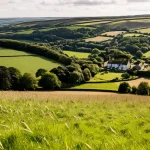Overview of Local Traditions in the UK and Their Relevance to Tourism
Local traditions in the UK serve as living reflections of the nation’s historical significance, deeply shaping its cultural identity. From ancient festivals to age-old ceremonies, these customs offer a window into the past, attracting visitors eager to experience authentic British heritage.
UK local traditions vary widely by region, highlighting the country’s rich regional diversity. For example, Scotland’s Highland games, Cornwall’s Helston Furry Dance, and Yorkshire’s well dressing showcase distinct local customs that emphasize the uniqueness of each area. This variety fuels cultural tourism, as travelers often seek out experiences that connect them with the specific character and history of the places they visit.
Also read : What Hidden Historical Sites in the UK Are Perfect for a Unique Vacation Experience?
Tourists increasingly value cultural authenticity, making local traditions a crucial factor in shaping UK tourism. Visitors look beyond standard attractions to immerse themselves in genuine customs, boosting interest in community-led events and regional celebrations. In essence, these traditions are not only vital for preserving heritage but also serve as dynamic drivers of tourism, enriching visitor experiences and supporting local economies.
Integration of Local Traditions into the UK Tourism Experience
The UK’s rich cultural tapestry comes alive through UK festivals and traditional events intricately woven into tourism experiences. Many tourism operators deliberately feature traditional events such as the Highland Games in Scotland, Notting Hill Carnival in London, and the St. Patrick’s Day celebrations in Northern Ireland within their itineraries. These UK festivals offer visitors an authentic glimpse into regional customs, making holidays both educational and enjoyable.
Additional reading : How Can You Enjoy the UK Countryside on Your Vacation?
Local customs often transition into accessible tourist attractions. For example, centuries-old ceremonies like the Changing of the Guard at Buckingham Palace have become iconic events that attract countless visitors annually. This shows how local customs can be preserved yet adapted to fit the interests of a global audience. Tourists gain insight into historical Americana while engaging directly with the living traditions of the area.
Collaboration is key: tourism providers work closely with local communities to ensure respectful, accurate representations of heritage. Community partnerships help create sustainable tourism models that benefit residents and visitors alike. By integrating UK festivals and traditions thoughtfully, the tourism sector fosters cultural appreciation and economic opportunity while preserving the essence of the nation’s celebrated events.
Positive Impacts of Local Traditions on UK Tourism
Local traditions provide a pathway to cultural immersion that greatly enriches UK tourism. When visitors engage with authentic travel experiences rooted in regional customs, they enjoy a deeper understanding of the community’s heritage. This connection fosters a unique sense of place, making trips more memorable and meaningful.
Such traditions allow tourists to participate in or observe time-honored practices, from seasonal festivals and craft demonstrations to local culinary events. These interactions promote visitor experiences that go beyond typical sightseeing. Travelers gain firsthand knowledge, enhancing their appreciation of the UK’s diverse cultures.
The result? A noticeable boost in visitor satisfaction. Tourists are more likely to share positive feedback and recommend destinations that offer genuine cultural exposure. This not only supports local economies but also helps preserve regional identities. By integrating local traditions into tourism, the UK invites travelers to explore with curiosity, respect, and enjoyment, ultimately strengthening the ties between visitors and communities.
Challenges and Considerations in Showcasing Local Traditions to Tourists
Presenting local traditions to tourists involves navigating complex tourism challenges that can impact the community and its heritage. One primary concern is the risk of commercialisation, which often leads to a loss of authenticity. When traditions are adapted or exaggerated solely for entertainment, their original meaning may be diluted, undermining the cultural identity that locals cherish.
Balancing tourism demand with respect for customs requires delicate handling. Tourists might expect engaging experiences, but communities strive to protect their values. This calls for transparent communication and expectations management to avoid misunderstandings that can offend or marginalize locals.
Effective tradition preservation demands sensitive management. This includes involving local voices in decision-making processes and ensuring that benefit-sharing empowers the community. When locals are active participants rather than passive observers, the integrity of traditions is better maintained. Proper regulation, visitor education, and monitored tourism flows also play vital roles in maintaining the authentic spirit of cultural events, which ultimately sustains both heritage and tourism livelihoods.
Real-life Examples of Local Traditions Enhancing Tourism in the UK
Local traditions play a vital role in creating unique tourist attractions that captivate visitors and enrich the cultural experience in the UK. One compelling case study is the Highland Games in Scotland, which showcase traditional Celtic sports and music. These events attract thousands of international visitors eager to witness activities like caber tossing and watch bagpipe competitions. The Highland Games not only preserve Scottish culture but also boost local economies through tourism.
Another outstanding UK tradition example is the Notting Hill Carnival. This vibrant, multicultural street festival celebrates Caribbean heritage with music, dance, and colourful costumes. It draws millions annually, providing visitors with a lively, immersive cultural experience that highlights the UK’s diversity.
Meanwhile, traditional English village fêtes bring rural communities to life, offering a window into the country’s pastoral charm. These fêtes often feature craft stalls, local food, and games—elements that appeal to urban tourists seeking authentic countryside experiences.
Together, these examples demonstrate how local traditions act as powerful magnets for tourism, building economic resilience while preserving cultural identities. These attractions clearly illustrate the symbiotic relationship between heritage and tourism in the UK.
Insights for Tourists and Industry Professionals
When planning travel advice for the UK, understanding and respecting local traditions is essential. Tourists should seek authentic experiences by engaging with the community during cultural festivals or local markets. This respectful engagement fosters meaningful connections and enriches a visit beyond surface-level sightseeing.
To enjoy true cultural immersion, tourists should consider timing their trips around notable events such as traditional fairs or heritage celebrations. Exploring lesser-known regions can also reveal unique customs and crafts that larger cities may not showcase. Practical travel advice includes learning basic phrases, observing etiquette, and asking permission before photographing local ceremonies.
For industry professionals, sustainable tourism planning involves integrating these traditions thoughtfully. Tour operators should collaborate with community leaders to design experiences that support local economies without disrupting daily life. Emphasising education about cultural significance through guided tours helps visitors appreciate the depth of UK heritage. Moreover, promoting off-peak visits can reduce crowd pressures while preserving traditional events’ integrity.
By blending cultural respect with strategic tourism planning, both tourists and professionals contribute positively to sustaining the UK’s rich and diverse traditions for future generations.


